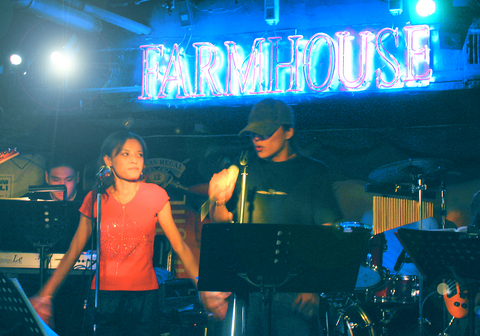Live-music junkies in Taipei have been in need of a fix. With the recent closure of Underworld, in the Taiwan Normal University neighborhood, the capital city has been left with one less venue at which to hear live bands. For Taipei, that's akin to a one-armed man losing a finger.
But Taipei's collective artistic memory is short. For nearly three decades there has been a place where live bands have plugged in and played even as its original crowds have grown older and its newer crowds have become smaller.
The Farmhouse, in Taipei's once-booming Combat Zone, started life as a "live music disco" before disco became something altogether different. And little has changed since, except the well-trodden dance floor doesn't get trod on much anymore.

PHOTO: DAVID MOMPHARD, TAIPEI TIMES
"There's a lot more people than this on the weekends," said Lin Zi-chun (
"It can even get crowded in here on Saturday, when Rubber Band plays," Lin said. "There'll be people on the dance floor doing the cha cha in a line. But it's not like what it used to be -- or at least what I've heard it used to be like."
What Lin has likely heard is about a time some 10 years ago or more, when punters were elbow-to-elbow, belly up to bar and the rest of the place was standing-room-only. The house band, MIT or Made in Taiwan, was well-known throughout the city and could pack the place even on weeknights. It wasn't uncommon to hear a 20-something Wu Bai (
What happened to the live music scene? Depending on who you ask, blame is assigned anywhere from the 1979 departure of the US military, who first made the area notoriously raucous and gave it its moniker -- to the rise of Taipei's East District (
Perhaps, for Farmhouse, the quality of the bands that started playing there precipitated the fall in the number of punters that came to hear them. Most of the early-week bands cover Western pop tunes from the 1980s and 1990s, reading the music from a book and in some cases stumbling through the lyrics. I last week heard the most desperate bar-room rendition of Desperado that has ever been performed; the singer called it quits after a dozen or so bars, apparently struggling to read his own handwri-ting and unsure of the notes.
As Lin said, the situation is different on the weekends, Saturdays especially, when veteran rockers Rubber Band take the stage and people line-up for the cha cha. But the question is, as Farmhouse nears 30 years old, will its long-standing punter-pulling acts like Rubber Band continue to pull in big enough crowds to keep the lights on?
Let's hope so. Or else Taipei's live-music junkies will be singing their own version of Desperado.
Where to go:
Farmhouse is located at 5, Ln 32, Shuangcheng St., Taipei
The current roster of bands includes Question (Tuesdays), Circle Band (Wednesdays), Blue Flame (Thursdays), Puzzle
(Fridays), Rubber Band (Saturdays) and Babes (Sundays).
Call (02) 2595 1764.

In Taiwan there are two economies: the shiny high tech export economy epitomized by Taiwan Semiconductor Manufacturing Co (TSMC, 台積電) and its outsized effect on global supply chains, and the domestic economy, driven by construction and powered by flows of gravel, sand and government contracts. The latter supports the former: we can have an economy without TSMC, but we can’t have one without construction. The labor shortage has heavily impacted public construction in Taiwan. For example, the first phase of the MRT Wanda Line in Taipei, originally slated for next year, has been pushed back to 2027. The government

July 22 to July 28 The Love River’s (愛河) four-decade run as the host of Kaohsiung’s annual dragon boat races came to an abrupt end in 1971 — the once pristine waterway had become too polluted. The 1970 event was infamous for the putrid stench permeating the air, exacerbated by contestants splashing water and sludge onto the shore and even the onlookers. The relocation of the festivities officially marked the “death” of the river, whose condition had rapidly deteriorated during the previous decade. The myriad factories upstream were only partly to blame; as Kaohsiung’s population boomed in the 1960s, all household

Allegations of corruption against three heavyweight politicians from the three major parties are big in the news now. On Wednesday, prosecutors indicted Hsinchu County Commissioner Yang Wen-ke (楊文科) of the Chinese Nationalist Party (KMT), a judgment is expected this week in the case involving Hsinchu Mayor Ann Kao (高虹安) of the Taiwan People’s Party (TPP) and former deputy premier and Taoyuan Mayor Cheng Wen-tsan (鄭文燦) of the Democratic Progressive Party (DPP) is being held incommunicado in prison. Unlike the other two cases, Cheng’s case has generated considerable speculation, rumors, suspicions and conspiracy theories from both the pan-blue and pan-green camps.

Stepping inside Waley Art (水谷藝術) in Taipei’s historic Wanhua District (萬華區) one leaves the motorcycle growl and air-conditioner purr of the street and enters a very different sonic realm. Speakers hiss, machines whir and objects chime from all five floors of the shophouse-turned- contemporary art gallery (including the basement). “It’s a bit of a metaphor, the stacking of gallery floors is like the layering of sounds,” observes Australian conceptual artist Samuel Beilby, whose audio installation HZ & Machinic Paragenesis occupies the ground floor of the gallery space. He’s not wrong. Put ‘em in a Box (我們把它都裝在一個盒子裡), which runs until Aug. 18, invites